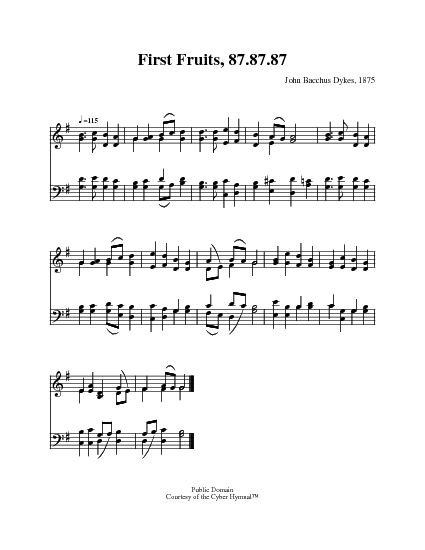Go Ad-Free
If you regularly use Hymnary.org, you might benefit from eliminating ads. Consider buying a Hymnary Pro subscription.
If you regularly use Hymnary.org, you might benefit from eliminating ads. Consider buying a Hymnary Pro subscription.

1. God the Father! Whose creation
Gives to flowers and fruits their birth,
Thou, whose yearly operation
Brings the hour of harvest mirth,
Here to Thee we make oblation
Of the August-gold of earth.
2. God the Word! the sun, maturing
With his blessèd ray the corn,
Spake of Thee, O Sun enduring,
Thee, O everlasting Morn!
Thee in whom our woes find curing
Thee that liftest up our horn.
3. God the Holy Ghost! the showers
That have fattened out the grain,
Types of Thy celestial powers,
Symbols of baptismal rain,
Shadowed out the grace that dowers
All the faithful of Thy train.
4. When the harvest of each nation
Severs righteousness from sin,
And archangel proclamation
Bids to put the sickle in,
And each age and generation
Sink to woe, or glory win;
5. Grant that we, or young, or hoary,
Lengthened be our span or brief,
Whatsoe’er the life long story
Of our joy or of our grief,
May be garnered up in glory
As Thine own elected sheaf.
6. Laud to Him to whom supernal
Thrones and virtues bend the knee;
Laud to Him from whom infernal
Powers and dominations flee;
Laud to Him the co-eternal
Paraclete, forever be.
Source: The Cyber Hymnal #1748
 John M. Neale's life is a study in contrasts: born into an evangelical home, he had sympathies toward Rome; in perpetual ill health, he was incredibly productive; of scholarly temperament, he devoted much time to improving social conditions in his area; often ignored or despised by his contemporaries, he is lauded today for his contributions to the church and hymnody. Neale's gifts came to expression early–he won the Seatonian prize for religious poetry eleven times while a student at Trinity College, Cambridge, England. He was ordained in the Church of England in 1842, but ill health and his strong support of the Oxford Movement kept him from ordinary parish ministry. So Neale spent the years between 1846 and 1866 as a warden of Sackvi… Go to person page >
John M. Neale's life is a study in contrasts: born into an evangelical home, he had sympathies toward Rome; in perpetual ill health, he was incredibly productive; of scholarly temperament, he devoted much time to improving social conditions in his area; often ignored or despised by his contemporaries, he is lauded today for his contributions to the church and hymnody. Neale's gifts came to expression early–he won the Seatonian prize for religious poetry eleven times while a student at Trinity College, Cambridge, England. He was ordained in the Church of England in 1842, but ill health and his strong support of the Oxford Movement kept him from ordinary parish ministry. So Neale spent the years between 1846 and 1866 as a warden of Sackvi… Go to person page >| First Line: | God the Father, whose creation |
| Author: | John Mason Neale |
| Language: | English |
| Copyright: | Public Domain |
God the Father, Whose creation. J. M. Neale. [Harvest.] Published in the Appendix to the Hymnal Noted, 2nd edition, 1864; and again in the author's posthumous Original Sequences, Hymns, &c, 1866, p. 69, in 6 stanzas of 6 lines. It has since appeared in the Appendix to Hymns Ancient & Modern, 1868; People's Hymnal, 1867; and several other collections.
--John Julian, Dictionary of Hymnology (1907)
God the Father, Whose creation. J. M. Neale. [Harvest.] Published in the Appendix to the Hymnal Noted, 2nd edition, 1864; and again in the author's posthumous Original Sequences, Hymns, &c, 1866, p. 69, in 6 stanzas of 6 lines. It has since appeared in the Appendix to Hymns Ancient & Modern, 1868; People's Hymnal, 1867; and several other collections.
--John Julian, Dictionary of Hymnology (1907)


 My Starred Hymns
My Starred Hymns